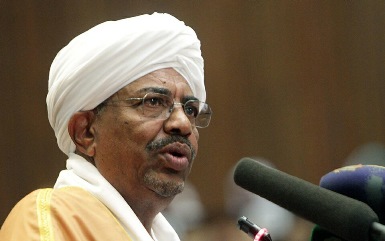Bashir vows to restore Sudan’s railway network
April 5, 2015 (KHARTOUM) – Sudanese president Omer Hassan al-Bashir has pledged to restore the national railway network following decades of negligence and mismanagement.

Atbara is an important railway junction and railroad manufacturing centre. It is known as the “Railway City” and was the headquarters for the Sudan Railways Corporation (SRC).
In his speech, Bashir considered restoration and development of the railway network a national project, vowing to implement the project by building wide railways for express trains.
Following decades of negligence and mismanagement, most of the railways became obsolete and went out of service but the government seeks to recover it with the help of Chinese expertise and money.
SRC currently owns 60 working trains but it can run as fast as 40 kilometres per hour (km/h) due to weak and limited capacity of the rails which were built by the British administration in Sudan between 1896 and 1930.
The rail system was constructed in 1875 as an adjunct to the Anglo-Egyptian military campaigns against the Mahdiyah.
Sudan used to have one of the longest railways in Africa covering around 5000 km and, extending from the Egyptian borders to Darfur in the west and from Port Sudan on the Red Sea coast to Wau in South Sudan.
The Sudanese president also promised to build another highway to link River Nile state with the capital, Khartoum, following an increase in the number of car accidents on the existing road due to heavy traffic.
He also vowed to build another high way on the west bank of the Nile, as well as provide electricity services to those affected by the construction of Merowe dam.
Bashir said the residents of the River Atbara will gain a lot of benefits from the Upper Atbara and Setit dam, vowing to build a bridge on the River Atbara.
He promised inhabitants of the River Nile that large agricultural investment will flow in the state, saying both investors and farmers will benefit from those projects.
(ST)
